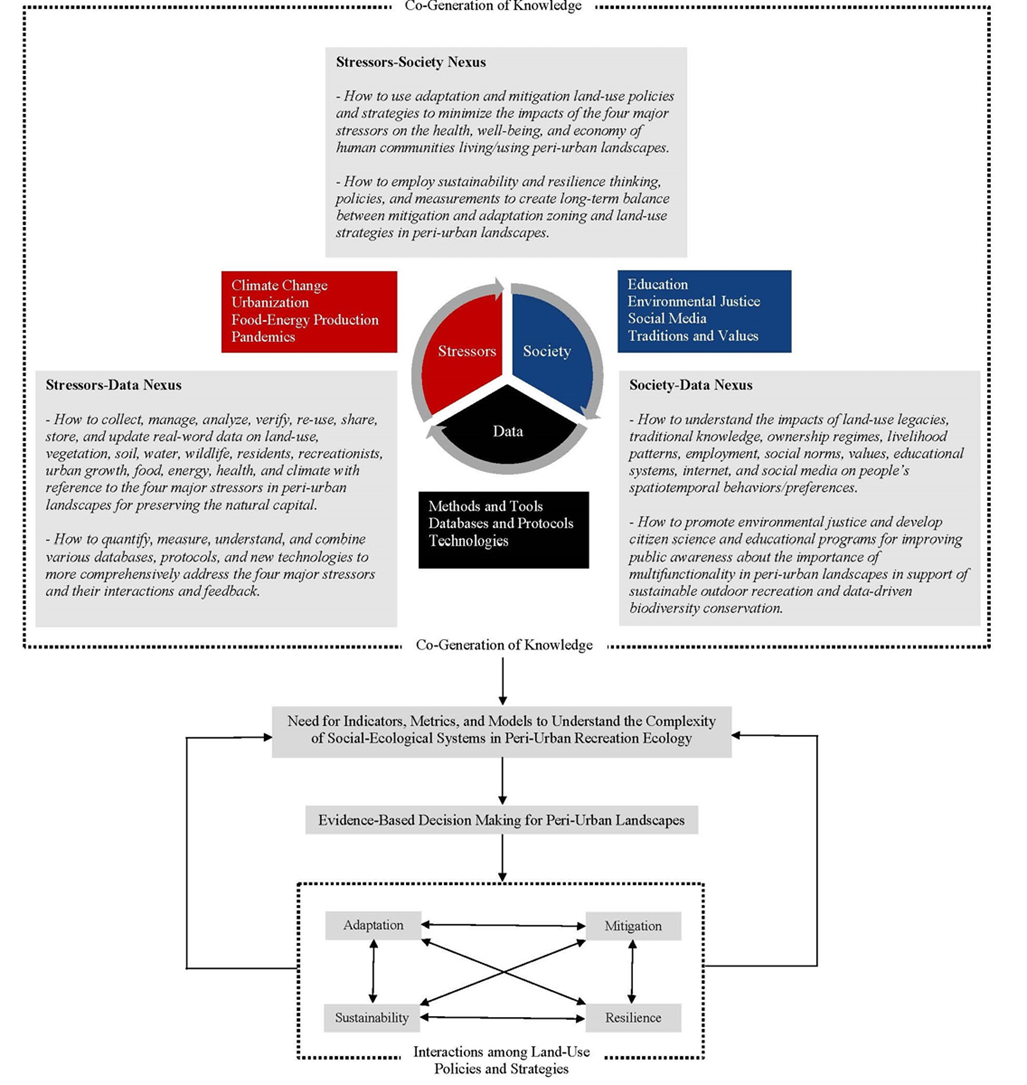Important points
◆Ten priority areas are proposed to guide future PURE research and balance recovery with biodiversity conservation.
◆Peri-urban landscapes are presented as complex social-ecological systems shaped by climate change, urbanization, societal values and digital technologies.
◆Increasing pressure on the outskirts leads to conflicts and synergies between recreation and environmental protection.
◆An interdisciplinary, data-driven and participatory approach is recommended to support evidence-based and equitable management of peri-urban landscapes.
Summary
Peri-urban landscapes are increasingly expected to balance outdoor recreation and biodiversity conservation, creating both trade-offs and opportunities. This perspective outlines interdisciplinary priorities for advancing periurban recreational ecology (PURE) in research, policy and practice. It is based on expert discussions from a session organized at the 12th MMV Conference (2024) with nine panelists from eight countries, followed by a virtual exchange from September 2024 to June 2025 and a review of current literature. The panel identifies PURE as a complex social-ecological system characterized by interactions between abiotic, biotic and cultural resources across space and time.
The research identifies four main stressors shaping PURE: climate change, urbanization, food-energy-land competition and pandemics. These drivers alter recreation patterns, biodiversity and land use, and interact with societal factors such as educational needs, environmental justice, social media influences and diverse cultural values.

Figure 1 presents PURE as a complex social-ecological system and shows how stressors, societal factors and data flows interact to influence recovery behavior and biodiversity outcomes.
The study highlights the importance of data-driven approaches, including new sources such as citizen science platforms, fitness apps and social media, while emphasizing the need for robust methodologies, databases and protocols. The co-generation of knowledge through interactions between stressors, society and data supports evidence-based decision making.
Ten priorities have been identified:
1. Conceptualization of a social-ecological systems approach;
2.Development of a comprehensive, interdisciplinary framework;
3. Improving participatory and data-driven knowledge;
4. Development of indicators, metrics and models;
5. Measuring the impact of proximity between the city and nature;
6. Development of site-specific land use strategies;
7. Understand the impact of social media;
8. Build capacity for unforeseen changes;
9. Improving sustainable multifunctionality;
10. Support environmental justice.
This study was supported by the following funding:
Open access funding from the Royal Institute of Technology. Stiftelsen for Miljöstrategisk Forskning (Grant No. DIA 2016/36); KTH Royal Institute of Technology (open access funding); Utah State University (travel funding); Bio diversa+, the European Biodiversity Partnership, European Commission (grant number 101052342); Svenska Forskningsrådet Formas (Grant No. 2022-01708); Research Council of Finland; German Research Foundation (DFG); l'Agence Nationale de la Recherche; Ministry of Science and Innovation (DSI); European Union research and innovation program Horizon Europe (grant number 101060415); JSPS KAKENHI (Grant No. JP22H03852, JP23H01584, JP25K15570); JST (Grant No. JPMJPF2110); HORIZON-TMA-MSCA-DN (grant number: 101120250); Horizon Europe research and innovation program of the European Union (grant number 101060429).
Paper information
Journal: Landscape Ecology
Title: Priorities for research, policy and practice in urban recreational ecology in a changing world
Type: perspective
Authors: Amin Rastandeh, Sara Borgstrom, Catherine Marina Pickering, Anna B. Miller, Davide Geneletti, Ryo Kohsaka, Jeff Rose, Amalia Engstrom, Eric Andersson, Anton Stahl Olafsson, Dagmar Haase
URL: https://link.springer.com/article/10.1007/s10980-025-02263-1
Authors (Prof. Kohsaka as 6th author)
Amin Rastandeh
Department of Strategic Sustainability Studies, Department of Sustainable Development, Environmental Science and Engineering, KTH – Royal Institute of Technology, Stockholm, Sweden
Sara Borgstrom
Department of Strategic Sustainability Studies, Department of Sustainable Development, Environmental Science and Engineering, KTH – Royal Institute of Technology, Stockholm, Sweden
Catherine Marina Pickering
School of Environment & Science, Griffith University, Gold Coast, Australia
Anna B. Miller
Department of Environment and Society, Utah State University, Logan, USA
Davide Geneletti
Laboratory of Ecosystem Services Planning and Urban Sustainability, Faculty of Civil, Environmental and Mechanical Engineering, University of Trento, Trento, Italy
Ryo Kohsaka
Graduate School of Agricultural and Life Sciences, University of Tokyo, Tokyo, Japan
Jeff Rose
Department of Parks, Recreation and Tourism, University of Utah, Salt Lake City, USA
Amalia Engstrom
Department of Urban and Rural Development, Swedish University of Agricultural Sciences, Uppsala, Sweden
Eric Andersson
Faculty of Life and Environmental Sciences, Ecosystem and Environmental Research Program and Helsinki Institute of Sustainability Science, University of Helsinki, Helsinki, Finland
Eric Andersson
Stockholm Resilience Centre, Stockholm University, Stockholm, Sweden
Anton Stahl Olafsson
Department of Geosciences and Natural Resources Management, University of Copenhagen, Copenhagen, Denmark
Dagmar Haase
Humboldt University of Berlin, Berlin, Germany
Dagmar Haase
Helmholtz Center for Environmental Research (UFZ), Leipzig, Germany
contact
The Laboratory of Forest Landscape Planning and Design, Department of Forest Sciences, Graduate School of Agricultural and Life Sciences, University of Tokyo
Tel: 03-5841-5218
Email: Kohsaka.Lab[at]gmail.com
(Please replace [at] with @ when contacting us.)
Related links
For more information about our research, please visit our websites:
Laboratory HP
Ryo KOHSAKA HP
Roaded THE FINAL LOVE. Fuile
